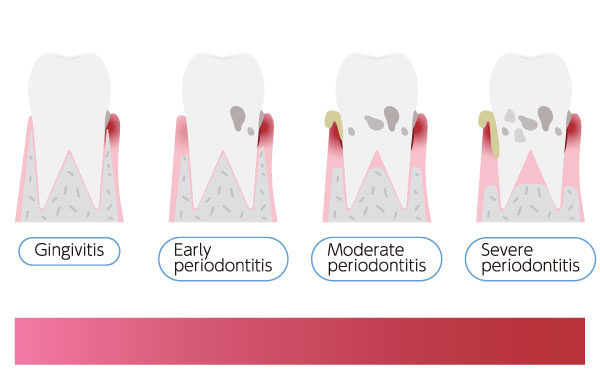Warning Signs and Treatment Options for Moderate Periodontal Disease
Moderate periodontitis, a serious form of gum disease, affects millions worldwide. Without prompt treatment, it can lead to tooth loss and systemic health complications. Recognizing the warning signs and seeking early intervention is key to maintaining oral health and preventing further damage.
Our Tacoma, WA, dentist emphasizes the importance of understanding moderate periodontitis, its symptoms, causes, and the most effective treatment options. To schedule an appointment, contact our Tacoma dental office at (253) 761-5422.

What Is Moderate Periodontitis?
Moderate periodontitis is an advanced stage of gum disease characterized by bacteria infiltrating below the gum line, causing inflammation and damage to the gums and supporting bone. This bacterial activity creates pockets between the teeth and gums, where more plaque and food particles accumulate, exacerbating the condition.
Without treatment, these pockets deepen, leading to advanced periodontitis. This stage can cause bone loss, gum recession, and eventual tooth loss. Dentists measure pocket depth to diagnose moderate periodontal disease and determine the best course of treatment.
Symptoms of Moderate Periodontal Disease
Key indicators of moderate periodontitis include:
- Swollen or Bleeding Gums: Inflamed, red, and tender gums that bleed during brushing or flossing.
- Bad Breath: Persistent foul breath caused by bacterial activity.
- Receding Gums: Gums pulling away from teeth, making them appear longer.
- Tooth Sensitivity: Increased sensitivity due to exposed tooth roots.
- Loose Teeth: Bone loss weakens tooth support, leading to mobility.
If you’re experiencing any of these symptoms, schedule a consultation with Dr. Arvind Petrie today at (253) 761-5422.
Risk Factors for Moderate Periodontitis
Several factors increase the risk of developing moderate gum disease:
- Poor oral hygiene
- Tobacco use
- Genetic predisposition
- Hormonal changes
- Systemic health conditions like diabetes
- Certain medications
- Poor nutrition
- Stress
- Teeth grinding
- Age-related vulnerability
Treatment Options for Moderate Periodontal Disease
Effective treatment options for moderate periodontitis include:
- Scaling and Root Planing: A deep cleaning procedure performed by a dental professional to remove plaque and tartar (calculus) from above and below the gum line. Root planing smooths tooth roots, encouraging gum reattachment and reducing bacterial buildup.
- Antibiotic Therapy: Antibiotics, either oral or topical, help control infection and inflammation. These may be applied directly to affected pockets or prescribed as part of a comprehensive treatment plan.
- Pocket Reduction Surgery: Surgical intervention may be necessary for deep periodontal pockets. The gums are lifted to access and clean affected areas, followed by repositioning to reduce pocket depth and promote healing.
- Soft Tissue Grafts and Bone Regeneration: Procedures such as soft tissue grafts or guided tissue regeneration can restore lost gum and bone tissue, improving the stability of affected teeth.
- Lifestyle Changes and Maintenance: Adopting healthy habits, such as quitting smoking and improving nutrition, is essential. Regular dental visits for professional cleanings every three to six months help monitor and manage the condition effectively.

Frequently Asked Questions
Can moderate gum disease be reversed?
While moderate gum disease can’t be reversed, timely treatment can halt progression, ease symptoms, and protect against further damage.
Does moderate periodontitis impact overall health?
Yes, untreated periodontitis is linked to systemic conditions such as heart disease, diabetes, and rheumatoid arthritis.
How can I prevent moderate gum disease?
Practicing good oral hygiene by brushing twice daily, flossing, and scheduling regular dental checkups. This is the best way to prevent gum disease. Avoid smoking and maintain a balanced diet to strengthen your oral health.
Can home remedies treat moderate gum disease?
Home care supports prevention but can’t replace professional gum disease treatment. Consult your dentist or periodontist for effective, evidence-based care.
Don’t Let Periodontitis Go Untreated
Moderate periodontitis requires immediate attention to safeguard your oral and overall health. With state-of-the-art techniques and personalized care, Dr. Petrie will develop a treatment plan tailored to your needs.
Call (253) 761-5422 today to schedule your appointment at our Tacoma dental office. We proudly serve patients in Tacoma, Lakewood, Puyallup, Federal Way, Gig Harbor, and University Place. Take the first step toward healthier gums and a confident smile—because your oral health matters.





















